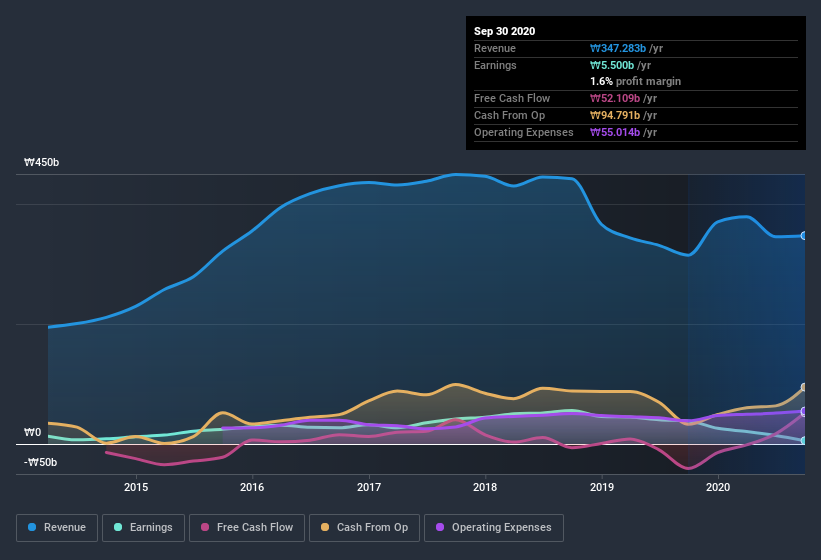- South Korea
- /
- Electronic Equipment and Components
- /
- KOSDAQ:A122990
Here's Why We Think WiSoLLTD's (KOSDAQ:122990) Statutory Earnings Might Be Conservative
It might be old fashioned, but we really like to invest in companies that make a profit, each and every year. However, sometimes companies receive a one-off boost (or reduction) to their profit, and it's not always clear whether statutory profits are a good guide, going forward. In this article, we'll look at how useful this year's statutory profit is, when analysing WiSoLLTD (KOSDAQ:122990).
It's good to see that over the last twelve months WiSoLLTD made a profit of ₩5.50b on revenue of ₩347.3b. In the last few years both its revenue and its profit have fallen, as you can see in the chart below.
View our latest analysis for WiSoLLTD

Importantly, statutory profits are not always the best tool for understanding a company's true earnings power, so it's well worth examining profits in a little more detail. As a result, today we're going to take a closer look at WiSoLLTD's cashflow, and unusual items, with a view to understanding what these might tell us about its statutory profit. That might leave you wondering what analysts are forecasting in terms of future profitability. Luckily, you can click here to see an interactive graph depicting future profitability, based on their estimates.
Zooming In On WiSoLLTD's Earnings
Many investors haven't heard of the accrual ratio from cashflow, but it is actually a useful measure of how well a company's profit is backed up by free cash flow (FCF) during a given period. To get the accrual ratio we first subtract FCF from profit for a period, and then divide that number by the average operating assets for the period. You could think of the accrual ratio from cashflow as the 'non-FCF profit ratio'.
As a result, a negative accrual ratio is a positive for the company, and a positive accrual ratio is a negative. While having an accrual ratio above zero is of little concern, we do think it's worth noting when a company has a relatively high accrual ratio. That's because some academic studies have suggested that high accruals ratios tend to lead to lower profit or less profit growth.
WiSoLLTD has an accrual ratio of -0.16 for the year to September 2020. That indicates that its free cash flow quite significantly exceeded its statutory profit. In fact, it had free cash flow of ₩52b in the last year, which was a lot more than its statutory profit of ₩5.50b. Notably, WiSoLLTD had negative free cash flow last year, so the ₩52b it produced this year was a welcome improvement. However, that's not all there is to consider. We can see that unusual items have impacted its statutory profit, and therefore the accrual ratio.
How Do Unusual Items Influence Profit?
WiSoLLTD's profit was reduced by unusual items worth ₩4.6b in the last twelve months, and this helped it produce high cash conversion, as reflected by its unusual items. In a scenario where those unusual items included non-cash charges, we'd expect to see a strong accrual ratio, which is exactly what has happened in this case. It's never great to see unusual items costing the company profits, but on the upside, things might improve sooner rather than later. We looked at thousands of listed companies and found that unusual items are very often one-off in nature. And that's hardly a surprise given these line items are considered unusual. Assuming those unusual expenses don't come up again, we'd therefore expect WiSoLLTD to produce a higher profit next year, all else being equal.
Our Take On WiSoLLTD's Profit Performance
Considering both WiSoLLTD's accrual ratio and its unusual items, we think its statutory earnings are unlikely to exaggerate the company's underlying earnings power. Looking at all these factors, we'd say that WiSoLLTD's underlying earnings power is at least as good as the statutory numbers would make it seem. Keep in mind, when it comes to analysing a stock it's worth noting the risks involved. While conducting our analysis, we found that WiSoLLTD has 3 warning signs and it would be unwise to ignore these.
Our examination of WiSoLLTD has focussed on certain factors that can make its earnings look better than they are. And it has passed with flying colours. But there are plenty of other ways to inform your opinion of a company. Some people consider a high return on equity to be a good sign of a quality business. So you may wish to see this free collection of companies boasting high return on equity, or this list of stocks that insiders are buying.
If you’re looking to trade WiSoLLTD, open an account with the lowest-cost* platform trusted by professionals, Interactive Brokers. Their clients from over 200 countries and territories trade stocks, options, futures, forex, bonds and funds worldwide from a single integrated account. Promoted
Valuation is complex, but we're here to simplify it.
Discover if WiSoLLTD might be undervalued or overvalued with our detailed analysis, featuring fair value estimates, potential risks, dividends, insider trades, and its financial condition.
Access Free AnalysisThis article by Simply Wall St is general in nature. It does not constitute a recommendation to buy or sell any stock, and does not take account of your objectives, or your financial situation. We aim to bring you long-term focused analysis driven by fundamental data. Note that our analysis may not factor in the latest price-sensitive company announcements or qualitative material. Simply Wall St has no position in any stocks mentioned.
*Interactive Brokers Rated Lowest Cost Broker by StockBrokers.com Annual Online Review 2020
Have feedback on this article? Concerned about the content? Get in touch with us directly. Alternatively, email editorial-team (at) simplywallst.com.
About KOSDAQ:A122990
WiSoLLTD
Manufactures and sells surface acoustic wave filters, duplexers, and modules in South Korea.
Excellent balance sheet, good value and pays a dividend.
Similar Companies
Market Insights
Community Narratives



